Blog Archives
‘Sally & Tom,’ Suzan-Lori Parks’ Brilliant Play About Hemings and Jefferson, a Must-see
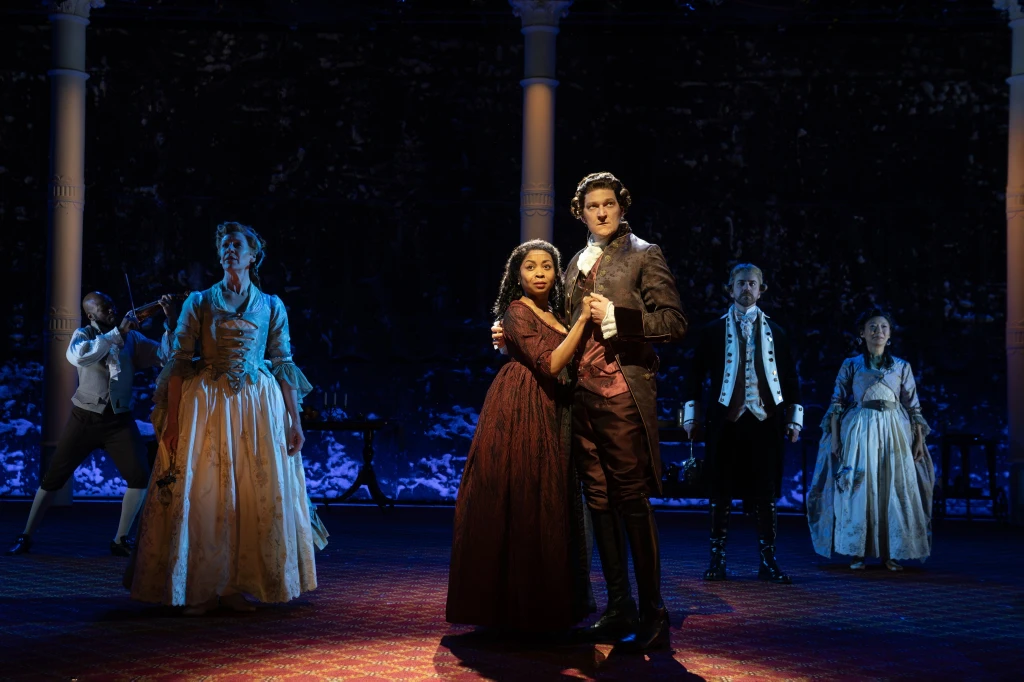
That “all humankind is created equal,” never was penned by Thomas Jefferson, nor by our most illustrious founding founders, who insured that only privileged white men with property were “equal” enough to vote. This is well noted by Suzan-Lori Parks in her satiric, New York premiere Sally & Tom, directed by Steve H. Broadnax III, currently running at the Public in its fourth extension until June 2nd.
Suzan-Lori Parks (2002 Pulitzer Prize and 2023 Tony Award winner for Best Revival of a Play for Topdog/Underdog), takes up Thomas Jefferson and fillets him for a farcical repast in this exceptional, complex new work. Examining Jefferson’s relationship with his slave mistress Sally Hemings (with whom he fathered six known children), Parks uses “their love” as fodder for her satiric cannons. She employs a play within a play structure to heighten the complexities of shedding noxious, historical, cultural notions and facing the contradictions in human behavior when attempting to do so.
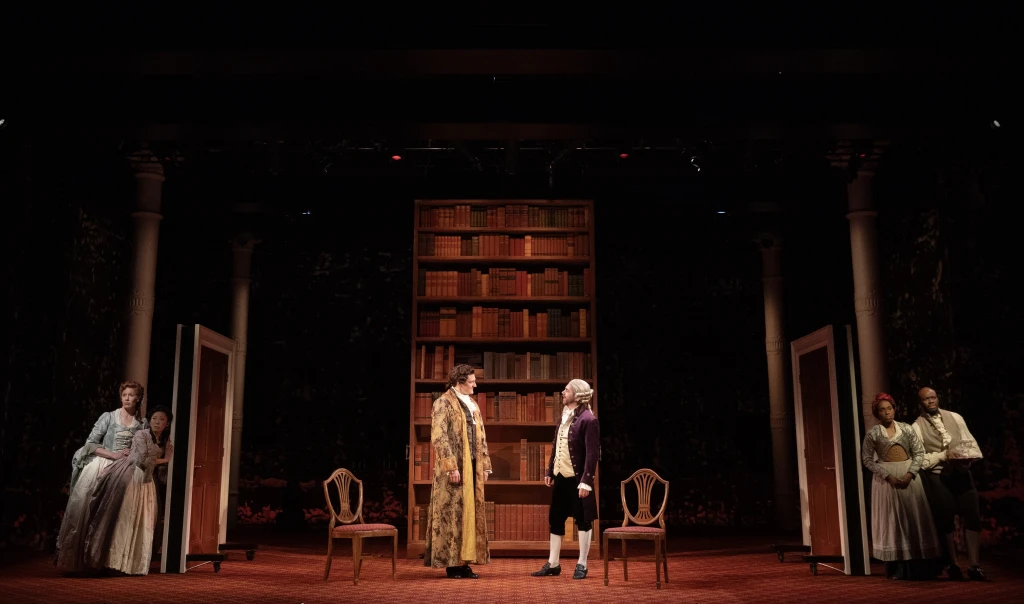
During the process, where she alternates scenes from the play Pursuit of Happiness set in the past, and the actors working backstage to rehearse, revise and reconfigure the play in the present, Parks elucidates themes about racism, slavery, the patriarchy and power domination. Gradually, she reveals how the actors, and three of the technical team realize that these elements permeate their cultural attitudes in their own lives, despite their assumptions that they’ve released themselves from such bondage. Parks’ intention is for us to identify with the Good Company’s enlightenment and self-awareness toward a new “freedom.” Finally, Parks uses the occasion to expose fascinating information about “Sally and Tom” that the audience may not have known before.
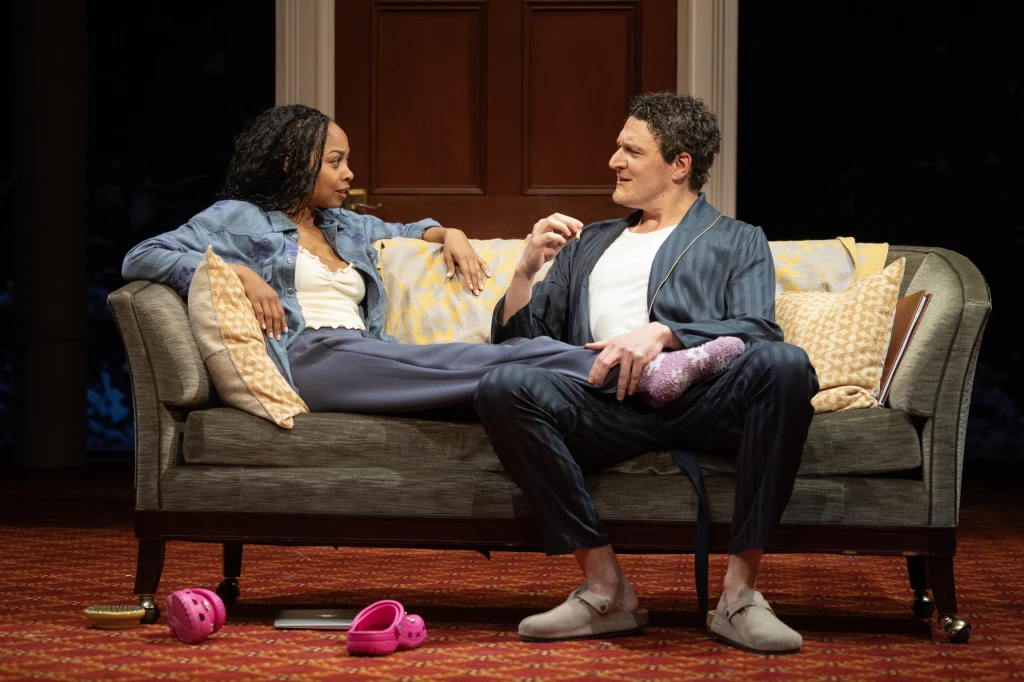
Taking cues from Parks’ dialogue, Broadnax III’s setting leaps seamlessly as it alternates back and forth from 1790, Monticello, Jefferson’s plush home where the play, Pursuit of Happiness predominately takes place. Then Sally & Tom shifts to the present, backstage, and in the apartment of actors and lovers, Mike, the director, who plays Jefferson (Gabriel Ebert), and Luce, the playwright, who plays Sally (Sheria Irving). Like the characters they portray, Mike and Luce are intimate partners in their lives. Like Sally Hemings, Luce discovers she’s pregnant during the course of reworking and acting her role in the Pursuit of Happiness.
As a humorous, Mark Twain-like ironist, Suzan-Lori Parks sends up the cliche that truth in life is stranger than fiction, as the parallels between Sally and Tom and Mike and Luce blow up by the conclusion.
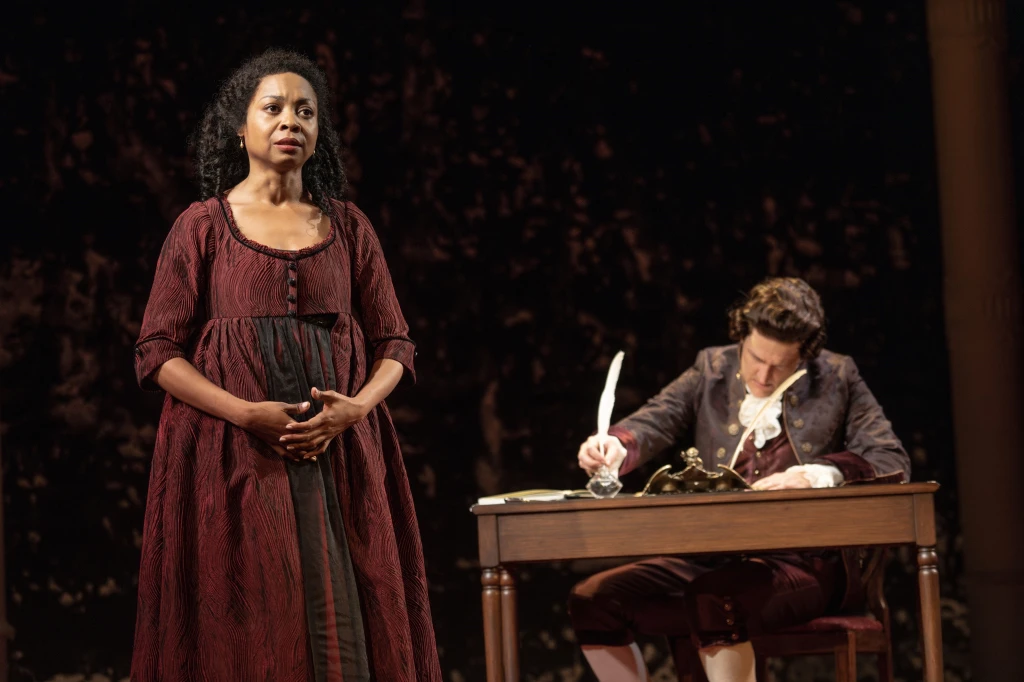
Broadnax III’s technical team crafts the sets (Riccardo Hernandez), costumes (Rodrigo Munoz), hair, wig, and make-up (J. Jared Janas & Cassie Williams), lighting (Alan C. Edwards), sound (Dan Moses Schreier), and music (composers-Parks and Dan Moses Schreier), to clarify when and where the action is unfolding. As the actors wrangle with increasingly desperate and funny problems, putting on the performance about Jefferson and Hemings, all of the characters/actors have different goals in their own pursuits of happiness. We get to see some of them blossom and others implode.
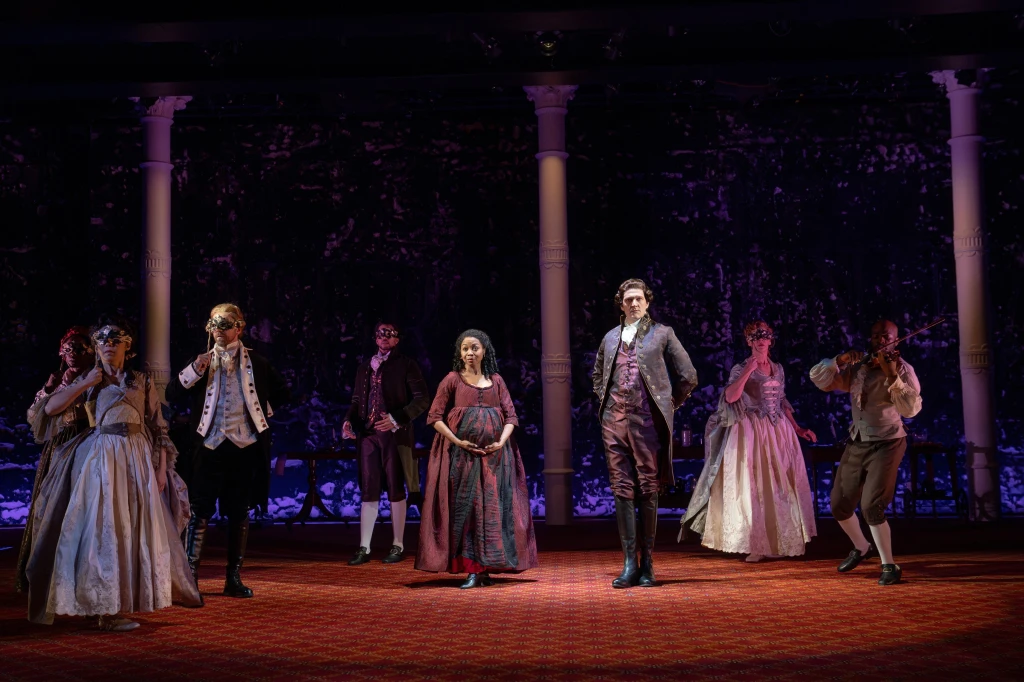
The enjoyment of Parks’ delightfully meaningful work is that one becomes immersed in both the Monticello past and the backstage present. The illusion of Jefferson’s Montocello is recreated at the top of the play as Tom and Sally dance the minuet accompanied on the violin by the slave, Nathan-actor counterpart Devon (Leland Fowler), as guests regaled in period clothes and wigs, enjoy their turns around the dance floor. As Parks exposes the colonial, repressive, anti-democratic culture of that time and stands it on its head in Pursuit of Happiness, she twits the current politically skewed theater trends presenting upbeat, nonthreatening productions, which offer “talk backs” when subjects skirt the edges of “triggering,” in order to “work through” potentially offended audience sensibilities.
Indeed, the actors of Good Company have changed their attitude toward offending audiences in this latest play to “stay alive,” and keep their company solvent. Good Company has been stretched to its limits in the past because audiences have rejected their “in-your-face” productions like “Listen Up, Whitey, Cause It’s All Your Fault.” Their producer and key financier Teddy schmoozes Luce and Mike to keep Pursuit of Happiness palatable to a diverse crowd.
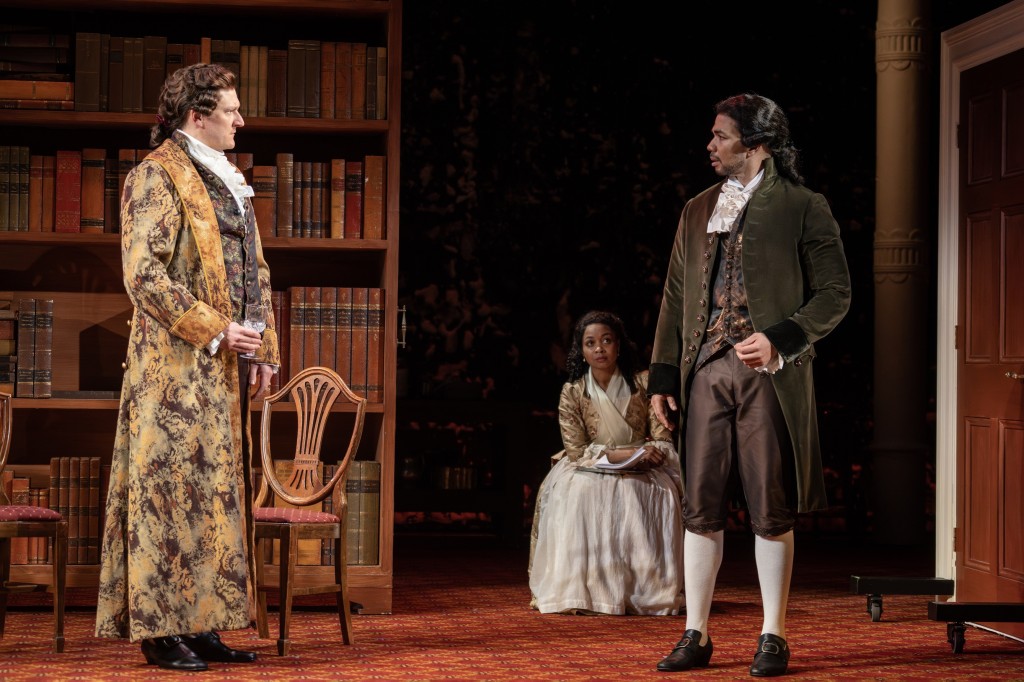
The play is heavy on accurate information. Jefferson’s “kindness” to his slaves is suggested up to a point. However, one senses the irony of a sub rosa rebellion underneath this essentially Black play which points up the scandalous “relationship” of the “good guy” Jefferson and presentation of Sally, Jefferson’s mistress, who gently gestures to her baby bump at the end of the play. Theirs was no love relationship, Luce, the playwright insists.
As the playwright Luce and director Mike rework various scenes, put in and take out inflammatory speeches, and try the patience of their producer, who eventually quits because the play is still too “in your face,” they evolve in their understanding. They are forced to modulate their impulses which reflect the present.
Some of the actors, prefer to show that the oppressed slaves had agency. In one instance, a beautiful speech is so incendiary, Teddy wants it to be removed because then, the play would be a hit and “sell,” and he’d get his money back, obviously. The point is made that during Jefferson’s time, a slave’s agency would be construed as an act of rebellion and punished with death.
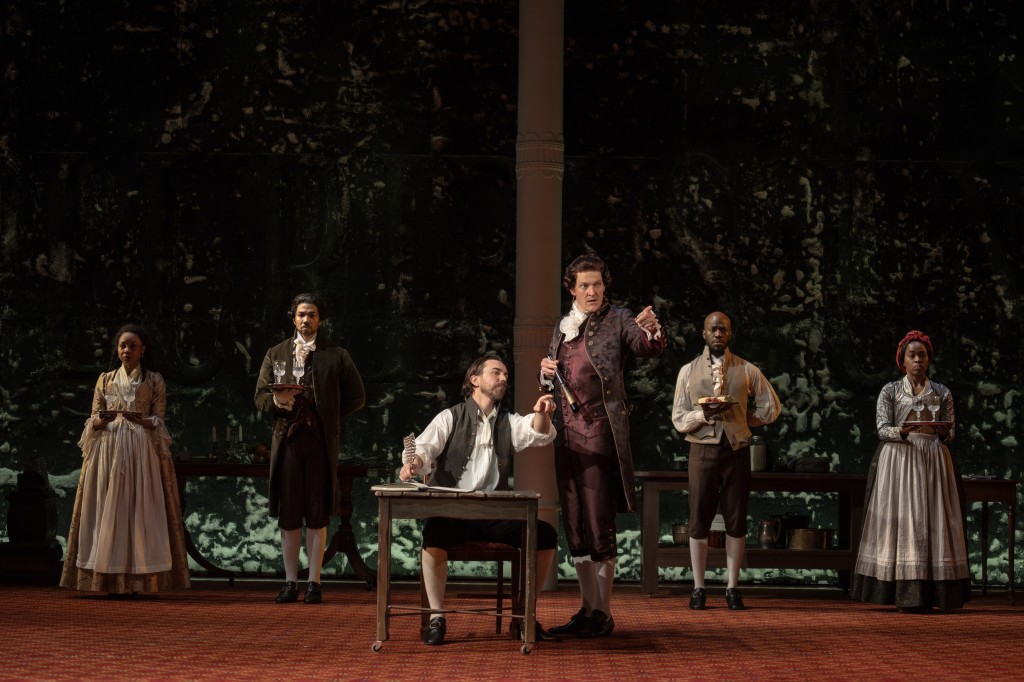
The tension between what was (the oppressive horrors of slavery), and what is (current cultural freedom especially in New York City), rocks Kwame (Alano Miller), who is on the verge of “making it” in the business. Kwame portrays Sally’s brother James, who Jefferson promised to free when they returned from Paris, where James enjoyed freedom as the other Blacks did. However, when Jefferson et. al. return to Virginia where slavery is the law of the land, Jefferson makes excuses about freeing James, because why would he do what is illegal and frowned upon by the society of his plantation peers?
James continually confronts Jefferson about his promised freedom, and stands up to Colonel Carey portrayed by Geoff (Daniel Petzold), who refers to Sally, his sister, as a “fine animal.” When Jefferson “mildly” rebuffs James telling him to “remember himself,” James holds forth in a three minute speech which producer Teddy insists must be cut.
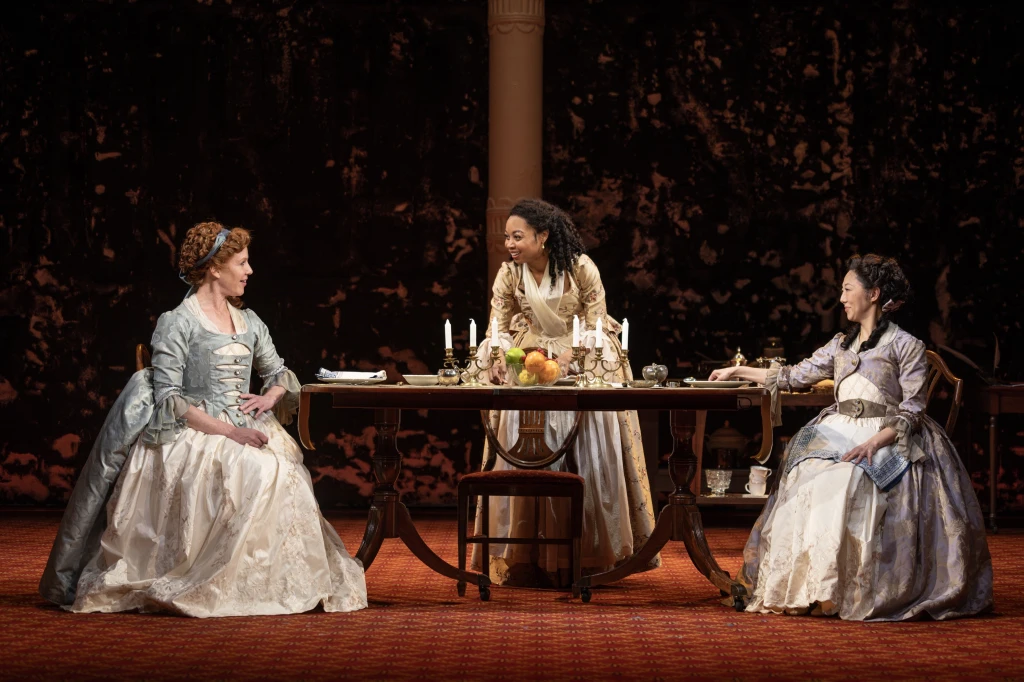
As brother James, Kwame enjoys speaking truth to power, though it is completely ridiculous for the 1790s South. It is clear that Kwame chafes at portraying a slave and feels he must redeem himself in such a role. The speech, which he delivers to “perfection” is his shining moment. The cast initially agrees and Luce, believing that Teddy is under her power, massages the producer to keep the speech and prevent Kwame from walking. Instead, Teddy quits and Mike and Luce are left with a financial abyss to fill and a long speech which makes no sense in Jefferson and the fledgling United States’ tide of times. Of course the “full of himself” Kwame believes his empowerment speech is the only value Pursuit of Happiness has.
The show, however, does go on as Mike and Luce’s relationship is sacrificed, Kwame quits, scenes are rewritten at the last minute and the acting “troopers” pull together and get to opening night. In the process, the farce unleashes and the admixture of revelation and forgiveness but not forgetfulness wins the day for the actors, and even for Sally and Tom at the “perfect” conclusion, that a sadder but wiser Luce has written for Pursuit of Happiness.

The actors are top notch in this glorious ensemble where Sun Mee Chomet, Kristolyn Lloyd and Kate Nowlin portray supporting roles. For those who gloried in founding father Thomas Jefferson’s iconic stature, Parks, speaking through Luce, pointedly suggests Sally did not love Tom. Though he supposedly was a kind master, unless one could go back in a time machine taking one’s present-day perceptions with them, it is impossible to know, given he kept 600 slaves and sold them off to raise money when he went to the Capitol, New York City. Finally, the audience is reminded that our great founding father never gave Sally her freedom. It was Jefferson’s daughter Patsy, disappointed at her father’s lascivious behavior, who finally freed Sally after Jefferson died.
If the Good Company had had their way with Teddy, who most probably insisted they change it, the title would have been E Pluribus Unum (“out of many, one”), instead of the benign Pursuit of Happiness. One would think that the implied unity has yet to be achieved in our nation, culturally fractured by foreign adversaries like Putin for politically opportunistic reasons. However, looking beyond social media posts of Marjorie Taylor Green, MAGAS, and Russian and Chinese trolls, federally, we are indeed, E Pluribus Unum, united and standing tall, while we attempt to iron out issues, as Parks points out, that are extremely complex.
Sally & Tom runs two hours, thirty-five minutes with one intermission at The Public Theater, on Lafayette Street. I loved it.